Language Policy
????
 LIP Theology 2023 Updated 22 Feb 2023.pdf
LIP Theology 2023 Updated 22 Feb 2023.pdf
?FACULTY OF THEOLOGY
LANGUAGE IMPLEMENTATION PLAN FOR 2023
1) Introduction / Context
a) Indicate which departments / individuals / stakeholder groups were consulted and how they were consulted in the compilation of the plan. Please ensure that all your departments / stakeholder groups did have an opportunity to provide input.
The faculty considers the language implementation plan as an ongoing process, in which students, lecturers, administrative staff and external stakeholders, like the six church partners through the Ecumenical Board of Stellenbosch 中国体育彩票, are continuously involved.
Students (through the Theological Student Committee (TSC) and various year group representatives) have also been offered the opportunity to respond through their participation in the Programme, Social Impact and Transformation committees; discussion groups; and electronic surveys. Faculty management members were also electronically consulted. Church partners, who have varying needs depending on the prevalent language(s) in use and also the home language of ministerial candidates, have the opportunity to discuss this with the faculty during meetings of the Ecumenical Board of the SU.
b) Indicate which student groups were consulted and how they were consulted in the compilation of the plan. Please ensure that all relevant student groups were consulted.
As noted above, student consultation takes places through the TSC which communicates with students via various platforms and class representatives. Students also have open (mass) meetings on matters that seem prominent, with a view to gaining broader consultation and addressing issues, including the issue of language.
2) Aims of LIP and promotion of multilingualism as well as isiXhosa as an academic language. Please include examples of how this will be done by also referring to e.g. tutorials, workshops and seminars.
The language implementation plan (LIP) of the Faculty of Theology wants to:
Comply with the 中国体育彩票’s Vision 2040 by means of a multilingual offering to enable inclusivity and equitable access to higher education.
Facilitate effective learning and teaching and research as well as service delivery at SU.
Promote multilingualism as an important characteristic of the faculty and its graduates.
The Faculty of Theology concurs with the essence of the new (2021) SU Language Policy.
One module (PT 254) was selected to also be taught in isiXhosa as an academic language. This pilot was launched in the second semester of 2021 and will continue in 2023.
3) Language use in Teaching and Learning
The SU Language Policy allows the following three options for utilising language in teaching:
Using Afrikaans and English in separate class groups where this is reasonably practicable and pedagogically sound;
Using Afrikaans and English in a single class group, where all information in each lecture is conveyed at least in English, accompanied by summaries or emphasis on content in Afrikaans;
Using one language where the assigned lecturer is proficient to teach only in Afrikaans or English. Simultaneous interpreting and ICT (eg podcasts and vodcasts) can also be employed to support students’ understanding of module content.
The use of Mobilex as learning app will be promoted at our faculty welcoming week and throughout the teaching semester.
In 2023, a renewed BTh degree ECP offering commences. This programme will follow the same language options stipulated per year group below. Additional modules added for this programme are highlighted.
a) Options used per year group
3.1 PARALLEL MEDIUM TUITION: SEPARATE AFRIKAANS AND ENGLISH CLASSES (7.1.3 of SU Language Policy)
Selected compulsory first and second year modules (BTh and BDiv) will, where reasonably practicable, offer lectures and tutorials in both Afrikaans and English. If all students in a class group are invited to vote by secret ballot, and all the students who vote, agree so unanimously, the module will be presented in Afrikaans or English only, conditional to the required language proficiency and agreement of the lecturer involved.
Module descriptions and assessment instructions (assignments, tests and examinations) will be made available in both Afrikaans and English.
Students will be allowed to write assignments, tests and examinations in either Afrikaans or English.
The same lecturer must be responsible for all lectures in a module as well as the setting of test and examination papers, depending on the language proficiency of the lecturer involved. In some modules, ad hoc lecturers are contracted to provide Afrikaans teaching, setting and marking of test and examination papers.
Tutorials will be utilised in such a manner as to serve the on-going commitment of the faculty to an inclusive culture in our university and country.
All hand-outs and PP-presentations must be tailored to the language used in a specific class presentation.
The following table provides a survey of undergraduate parallel medium tuition modules in the Faculty of Theology.
PMT-MODULES: SEPARATE AFRIKAANS & ENGLISH CLASSES
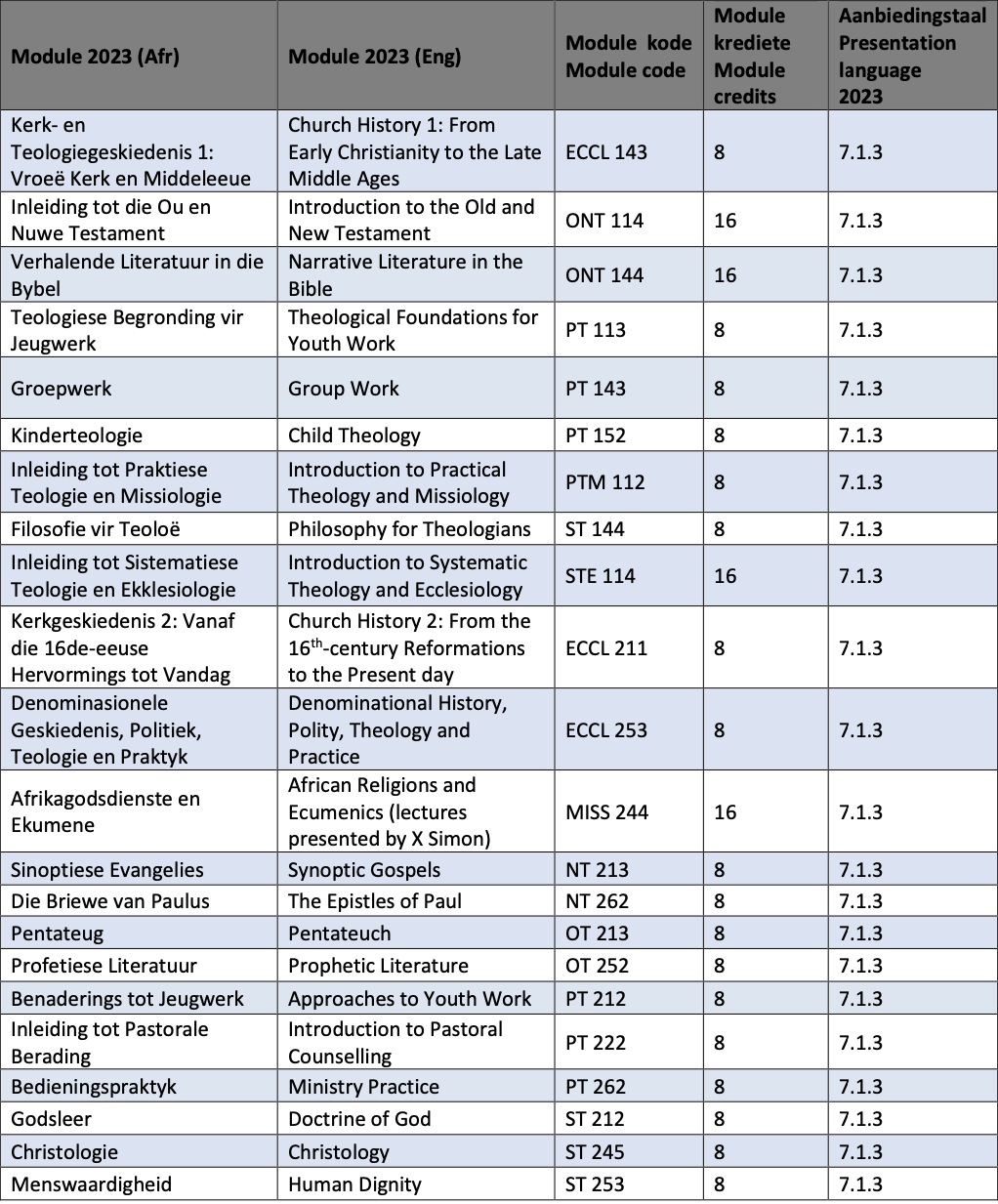
3.2 AFRIKAANS AND ENGLISH IN THE SAME CLASS (7.1.4 of SU Language Policy)
Lectures will be conducted in English and Afrikaans with summaries and clarification of key concepts in both languages. All hand-outs and PP-presentations must be in Afrikaans and English. Questions can be posed in class by students in both Afrikaans and English and answers will (where possible) be given in the language of preference. Module descriptions and assessment instructions (assignments, tests and examinations) will also be made available in both Afrikaans and English. Students will be allowed to write assignments, tests and examinations in either Afrikaans or English. Tutorials will be utilised in such a manner as to serve the ongoing commitment of the faculty to an inclusive culture in our university. If possible, separate tutorials will be conducted in Afrikaans and English. Tutorials in isiXhosa can also be considered where reasonably practical.
The following table provides a survey of undergraduate modules in the Faculty of Theology where Afrikaans and English are used in the same class.
In 2023, a BTh degree Part-time offering will officially commence. The language of presentation for this programme will be face to face contact blocks, online lectures and tutorials in English. Hand-outs, PP-presentations and tutorials will be made available in English and Afrikaans.
MODULES WITH AFRIKAANS & ENGLISH IN SAME CLASS
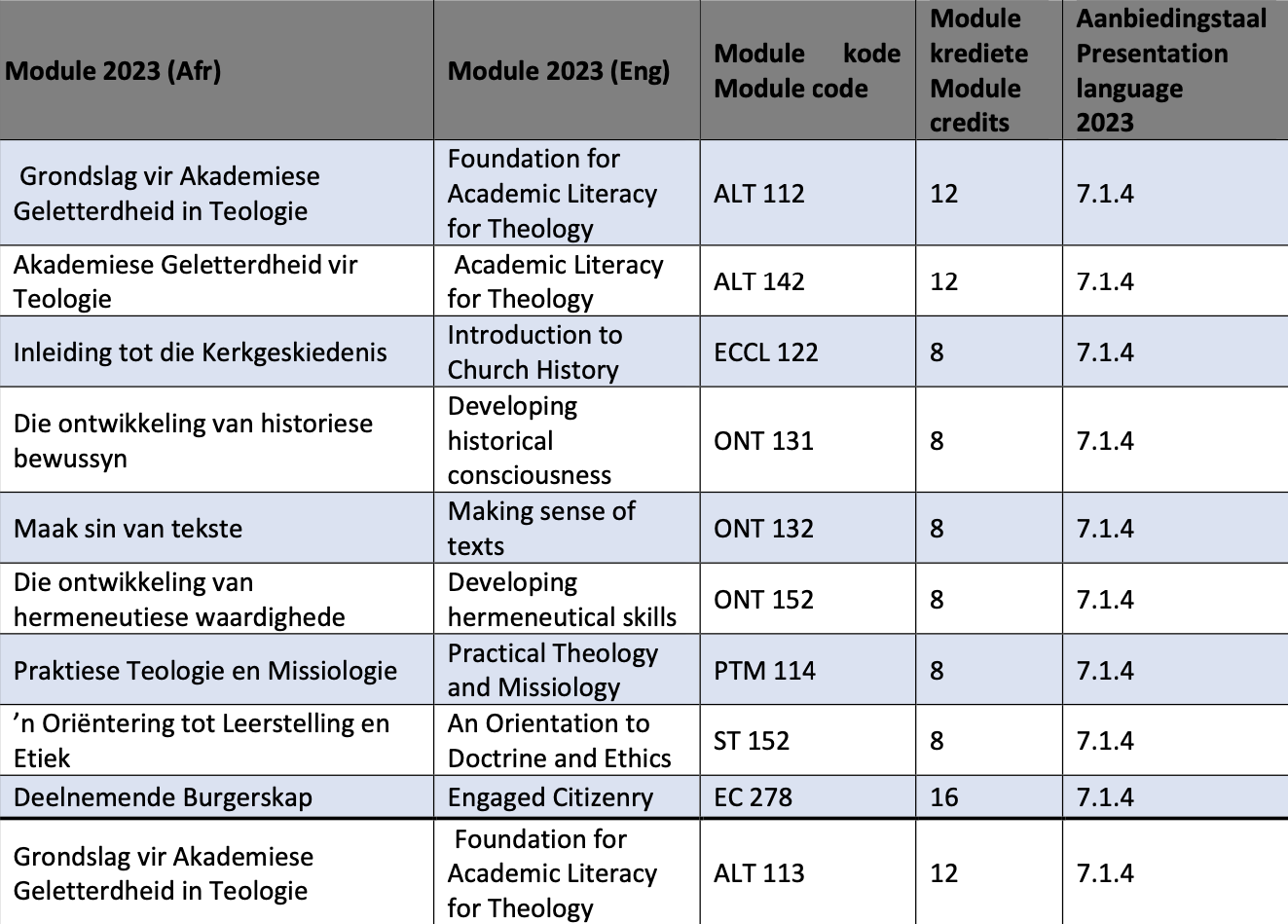
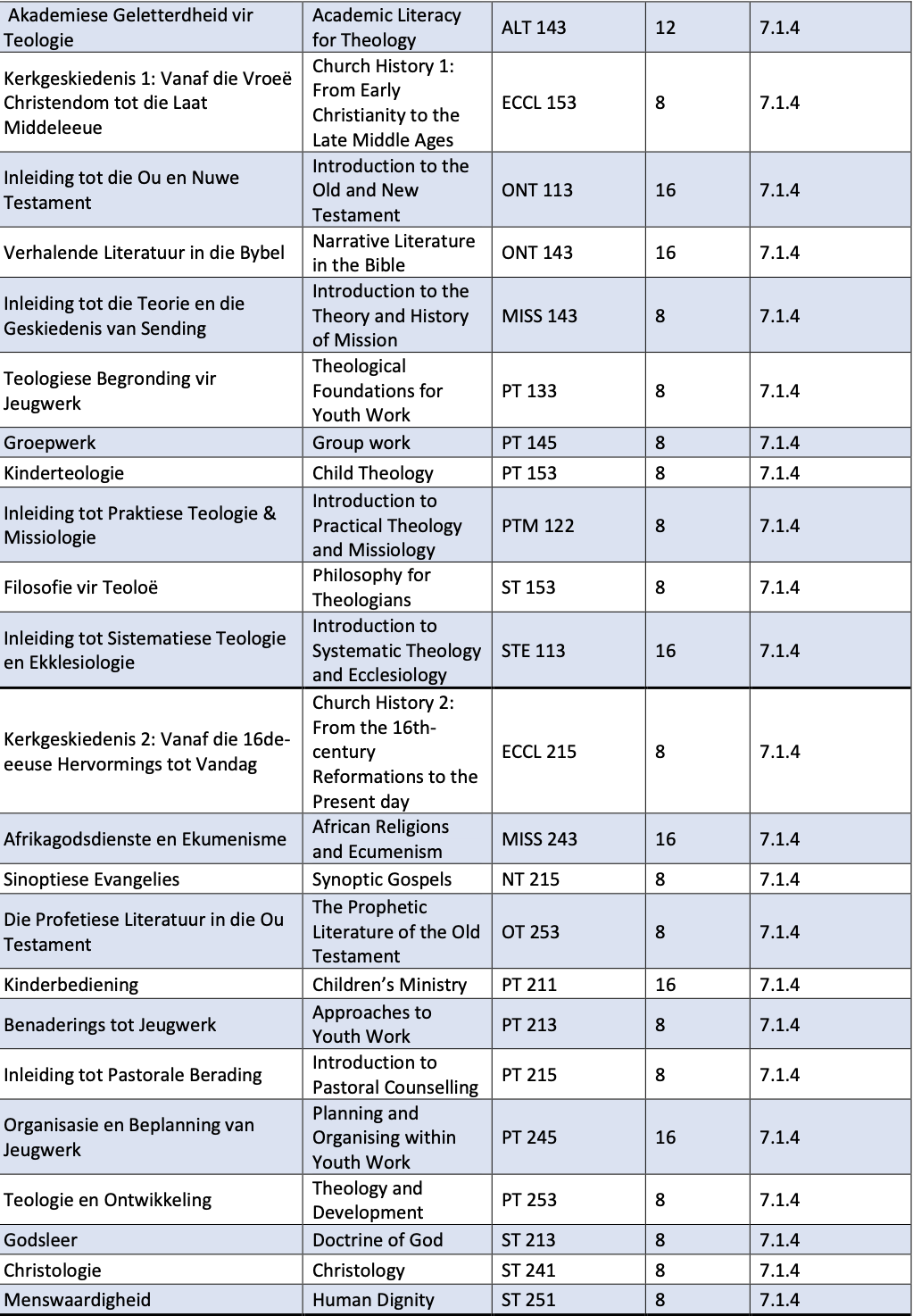
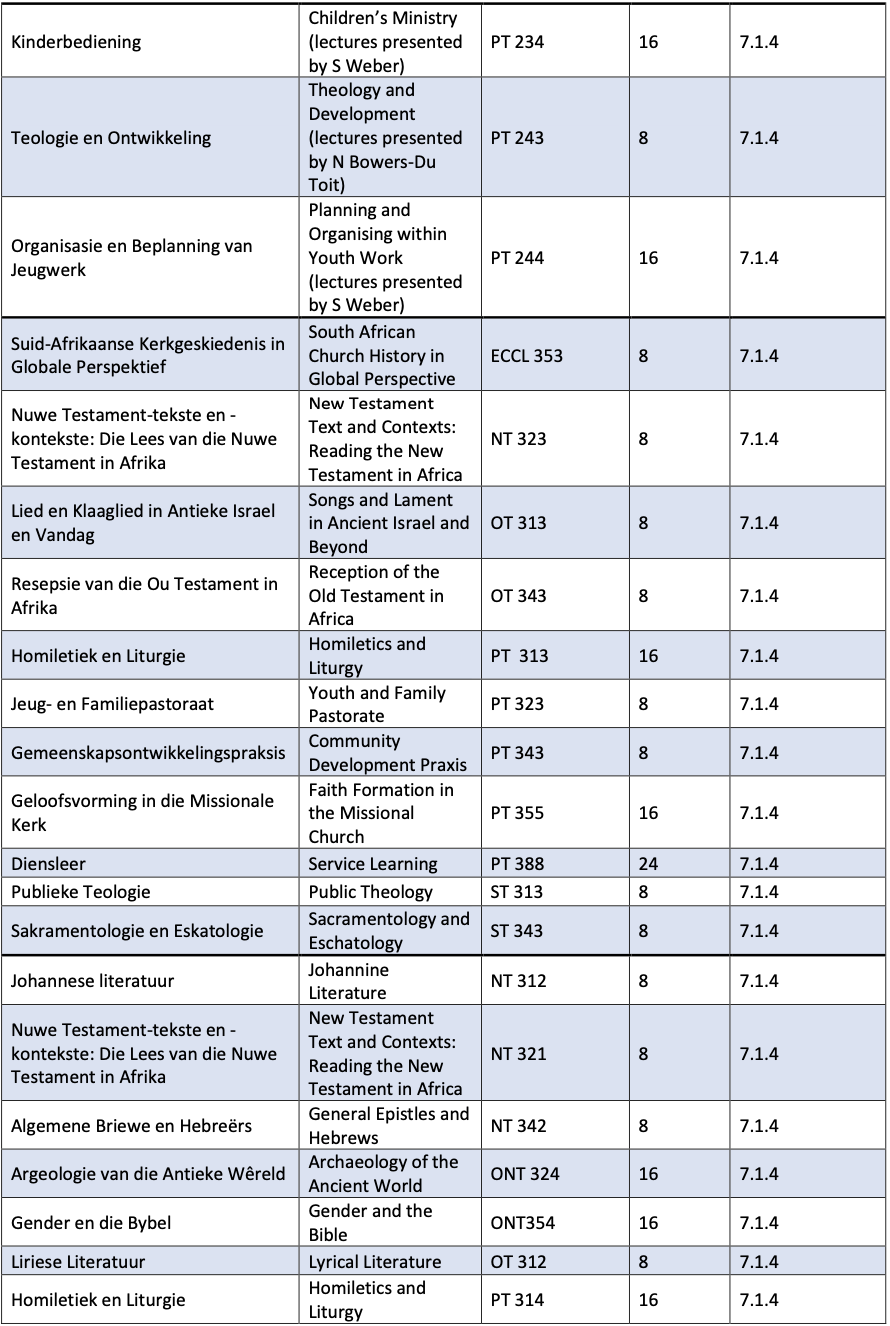
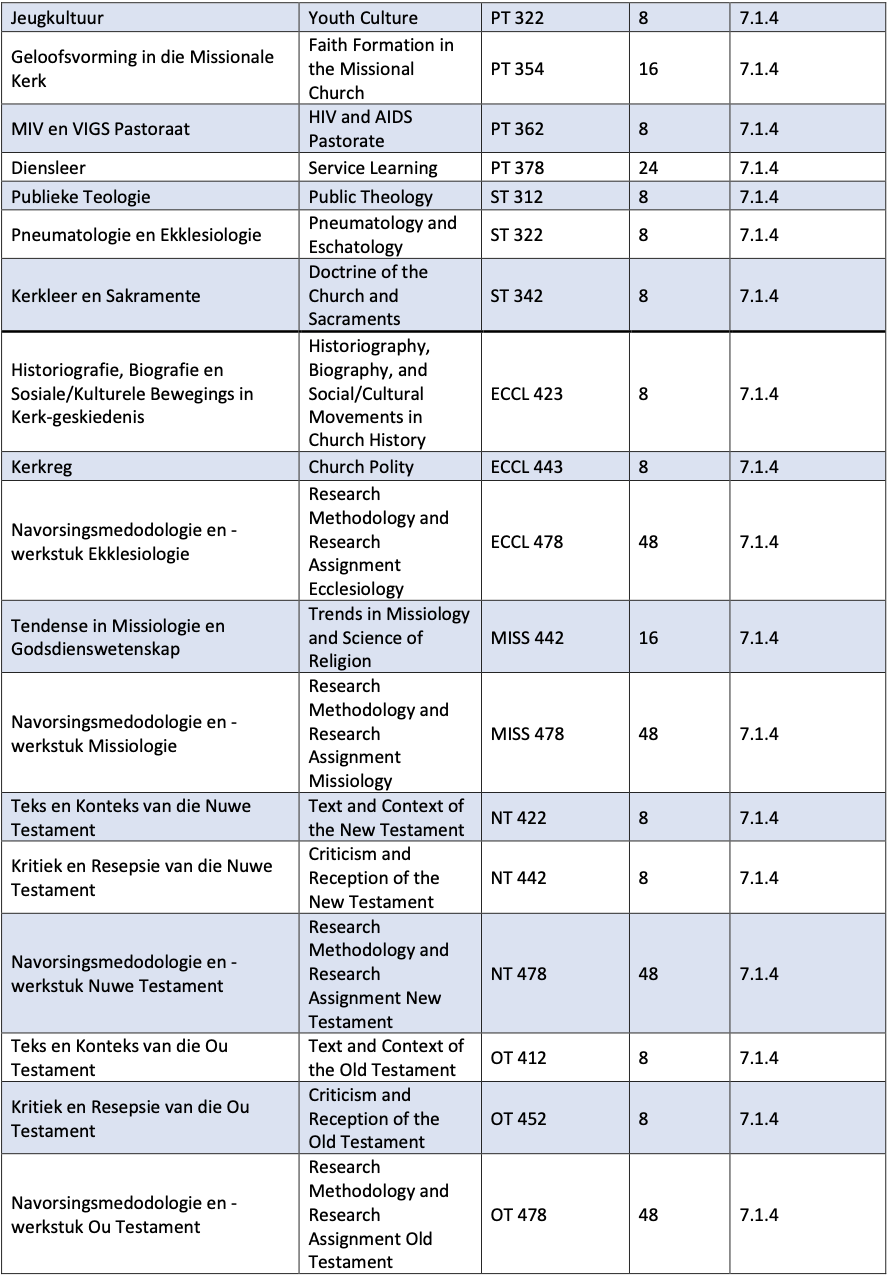 ?
?
?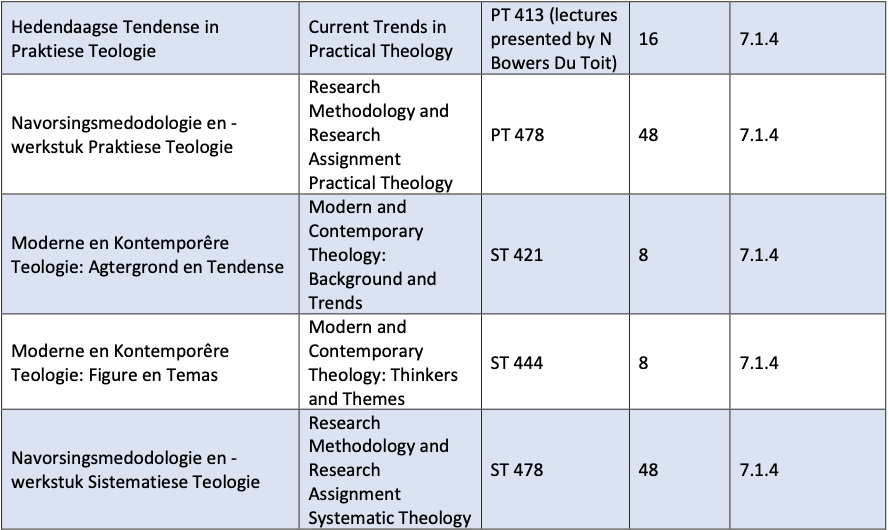 ???
???
MODULES WITH AFRIKAANS & ENGLISH & isiXHOSA IN SAME CLASS

3.3 ONLY ONE LANGUAGE IN A CLASS
Where the assigned lecturer can only teach in Afrikaans or English, lectures will be offered in one language only. Students will be informed accordingly.
For these modules additional support will be provided:
If the lectures of the first-year modules are in Afrikaans, SU makes simultaneous interpreting available in English. If the lectures are in English, SU makes simultaneous interpreting available in Afrikaans. During the second and subsequent years of study, simultaneous interpreting is made available by SU upon the request of staff if the needs of students warrant the service and SU has the resources to provide it. If two weeks have passed with no students making use of the interpreting service, it may be discontinued.
In addition to lectures, there are appropriate facilitated learning opportunities (additional consultations, tutorials, podcasts etc) in Afrikaans and English.
As noted above, in 2023 PT 254 will serve as a pilot module for offering isiXhosa as academic language. The decision on how this will be continued in subsequent years will be made during the year, on the basis of consultations with all the stakeholders concerned.
MODULES USING ONLY ONE LANGUAGE IN A CLASS
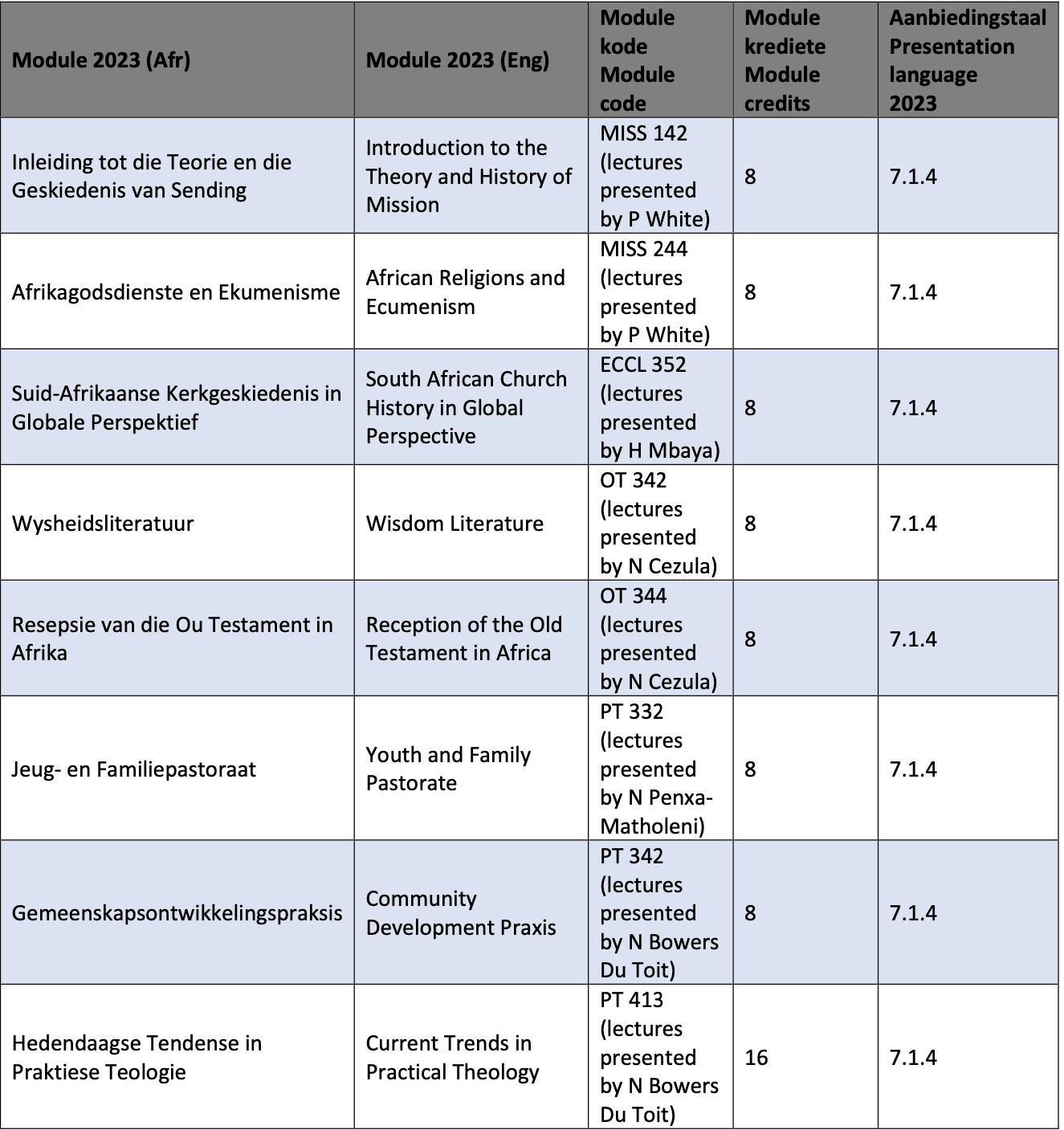
3.4 STUDENTS WITH SPECIAL NEEDS (7.1.10 of SU Language Policy)
Students with special learning needs and disabilities will be assisted in accordance with the appropriate SU Policy.
Students with special visual needs can be provided with braille or enlarged texts, in liaison with SU’s Disability Unit.
Students with special hearing needs can be supported with sign-language interpretation and real-time captioning during lectures and tutorials, where it is reasonably practicable to do so.
The Foundation for Academic Literacy module was introduced as part of our BTh Hybrid programme (now the BTh Part-time programme) in semester one of 2021, followed by Academic Literacy for Theology (ALT 144) in the second semester. These modules aim to promote and develop academic and digital literacy and the appropriate knowledge, skills and attitudes to become a successful Theology student and competent professional.
3.5 POSTGRADUATE STUDENTS
Communication with postgraduate students will be predominantly in English.
Students will still have the opportunity to write their theses and dissertations in either Afrikaans or English.
b) Exceptions and motivation of exceptions
None noted.
4) Language in Administration
Communication in general will be conducted in both Afrikaans and English, in a manner that will enhance comprehension and inclusivity for all parties concerned.
The language of written communication within the faculty and meetings will depend on the language needs of the readers or participants (staff, students and other stakeholders), provided that no one is excluded by the language of communication.
The use of Afrikaans, English and isiXhosa in promoting events will continue during the year.
5) Feedback mechanisms on implementation (good practice and complaints)
6) Any additional aspects not addressed in previous sections
Funding will be required for PMT modules as well as the translation of study material in the other two categories (see sections 3.2 and 3.3 above). The faculty will also make use of central funding to pay ad hoc staff to assess assignments and tests in situations where lecturers are not proficient in one of the academic languages.
7) Conclusion
The Language Implementation Plan of the Faculty of Theology will be considered for revision annually in view of the availability of staff, personnel feedback, student feedback and changes made to the SU Language Policy.
Addendum: Individual module language specifications (see Excel spreadsheet) ?




